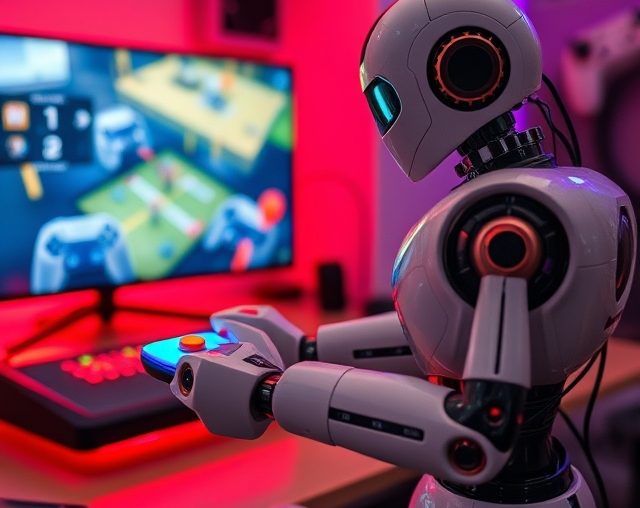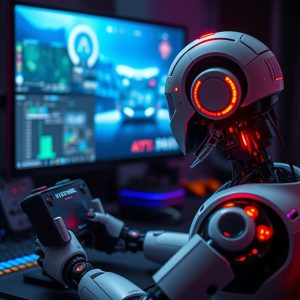How AI is Transforming the Gaming Industry: Key Use Cases
The gaming industry has been profoundly transformed by AI, enhancing both game development and player experiences. Below are some prominent AI use cases that are reshaping gaming:
Non-Player Characters (NPCs)
Developers use AI to create more realistic and intelligent NPCs. These characters adapt to player actions, exhibit lifelike behaviors, and provide engaging interactions.
For example, in The Elder Scrolls V: Skyrim, NPCs respond to player behavior—guards approach when weapons are drawn, and shopkeepers call for help if players steal items.
Procedural Content Generation
AI algorithms dynamically generate diverse game environments, levels, and content. This means developers spend less time on manual creation, and players experience unique worlds every time.
For instance, in Minecraft, AI generates endless unique landscapes as players explore, making each game world distinct.
Game Testing and Quality Assurance
AI-driven bots are deployed to test games, detecting bugs, glitches, and balance issues. Consequently, QA is accelerated and problems that might be missed by human testers are identified.
For example, AI bots play Call of Duty to spot glitches and tricky spots, helping developers fix issues before launch.
Player Behavior Analysis
AI analyzes player behavior to understand preferences, skill levels, and patterns. Moreover, this data personalizes gameplay, recommends content, and informs design improvements.
In Fortnite, AI suggests skins and items based on individual play styles.
Adaptive Difficulty
AI adjusts game difficulty in real time based on player performance. Therefore, challenges stay engaging without causing frustration, accommodating different skill levels.
For example, in Left 4 Dead, the AI Director modifies zombie numbers and strength according to player skill.
Cheat Detection
AI systems monitor in-game activities to detect and prevent cheating. In addition, machine learning identifies suspicious patterns and enforces fair play.
For instance, Counter-Strike: Global Offensive uses AI to detect and ban cheaters using hacks.
Virtual Assistants and Companions
AI-driven virtual assistants provide hints, tips, and tutorials. Furthermore, AI companions assist players during gameplay, enriching the experience.
For example, in The Legend of Zelda: Breath of the Wild, Navi guides players with helpful tips.
Storytelling and Plot Development
AI creates dynamic storylines that evolve with player choices, delivering immersive, personalized narratives.
For example, in Detroit: Become Human, AI tailors the story based on player decisions.
Voice and Speech Recognition
AI-powered voice recognition enables players to control games and interact with NPCs using natural language. As a result, gameplay becomes more intuitive.
In Tom Clancy’s EndWar, voice commands are enabled by AI to control units.
Enhanced Graphics and Animation
AI techniques, including deep learning, improve graphics rendering and animations for more realistic visuals.
For example, Red Dead Redemption 2 features AI-enhanced animations that bring characters and animals to life.
Predictive Analytics for Marketing and Sales
AI analyzes market trends and player data to forecast sales and optimize marketing strategies. Moreover, this helps target the right audience and maximize revenue.
For example, player data from Candy Crush is analyzed by AI to predict purchasing behavior and offer targeted deals.
Virtual Reality (VR) and Augmented Reality (AR)
AI enhances VR and AR by creating responsive, immersive environments that react to player movements.
Example: In Pokemon Go, AI integrates Pokemon into real-world settings via the phone’s camera.
Multiplayer Matchmaking
AI matches players of similar skill levels, ensuring balanced and enjoyable multiplayer experiences.
Example: Overwatch uses AI matchmaking for competitive, fair games.
Game Design and Development Assistance
AI tools assist developers with asset creation, coding, and testing, streamlining development and fostering creativity.
Example: No Man’s Sky development benefits from AI-generated detailed assets and environments.
Emotion Recognition
AI analyzes players’ facial expressions and emotions to adapt gameplay, creating a more responsive experience.
Example: Future games may use AI to adjust difficulty or atmosphere based on player emotions detected through webcams.



